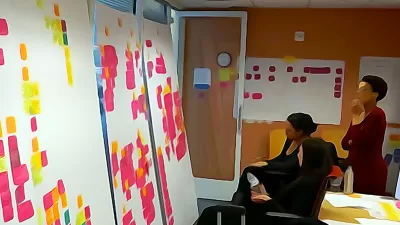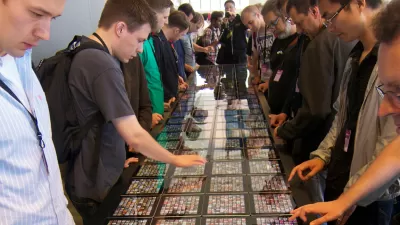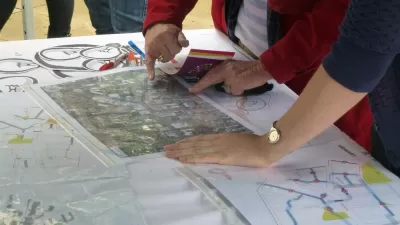A new generative tool developed by Sidewalk Labs uses machine learning and computational design to generate millions of comprehensive planning scenarios.
Violet Whitney shares news of a new generative design tool developed by the team at Sidewalk Labs, including the demo video shared above.
Whitney describes the need for the project as follows:
Today, the various experts on a planning team often run separate analyses to produce a neighborhood design: an architect uses one type of software to simulate sunlight, an engineer uses another to plan streets, a real estate developer models economics in a spreadsheet, and so on. The time and cost needed to coordinate all these competing elements often means a project can only afford to develop a handful of designs for the project team, with limited insight into how these options will impact the community.
The new tool does two things previously unavailable among design software options:
First, using machine learning and computational design, it can help planners generate not just one or two but millions of comprehensive planning scenarios. Second, it can help evaluate all kinds of impacts these different scenarios could have on key quality-of-life measures, producing a set of options that best reflects a community’s priorities.
The article includes a case study, set in a two-block urban area—to show how the new generative tool works. The post also imagines that this kind of generative design tool could eventually become a powerful tool of community engagement.
FULL STORY: A first step toward the future of neighborhood design

Maui's Vacation Rental Debate Turns Ugly
Verbal attacks, misinformation campaigns and fistfights plague a high-stakes debate to convert thousands of vacation rentals into long-term housing.

Planetizen Federal Action Tracker
A weekly monitor of how Trump’s orders and actions are impacting planners and planning in America.

In Urban Planning, AI Prompting Could be the New Design Thinking
Creativity has long been key to great urban design. What if we see AI as our new creative partner?

King County Supportive Housing Program Offers Hope for Unhoused Residents
The county is taking a ‘Housing First’ approach that prioritizes getting people into housing, then offering wraparound supportive services.

Researchers Use AI to Get Clearer Picture of US Housing
Analysts are using artificial intelligence to supercharge their research by allowing them to comb through data faster. Though these AI tools can be error prone, they save time and housing researchers are optimistic about the future.

Making Shared Micromobility More Inclusive
Cities and shared mobility system operators can do more to include people with disabilities in planning and operations, per a new report.
Urban Design for Planners 1: Software Tools
This six-course series explores essential urban design concepts using open source software and equips planners with the tools they need to participate fully in the urban design process.
Planning for Universal Design
Learn the tools for implementing Universal Design in planning regulations.
planning NEXT
Appalachian Highlands Housing Partners
Mpact (founded as Rail~Volution)
City of Camden Redevelopment Agency
City of Astoria
City of Portland
City of Laramie





























